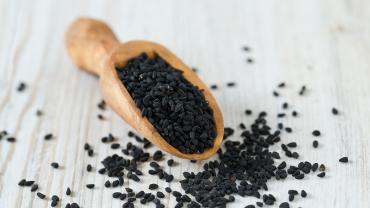
Nigella seeds, also known as black cumin seeds (Nigella sativa) have been used for both food and medicine for centuries. Nigella seeds were found buried in the tomb of an Egyptian pharaoh as a sign of how deeply valued they were even back then. In Old Latin, nigella seeds were called panacea, which means cure-all. Modern science has begun to adopt our predecessors’ uses that are now based on plentiful research to suggest that nigella seeds are beneficial for a variety of conditions.
Nigella seeds contain hundreds of phytoconstituents, including alkaloids, sterols, saponins, linoleic acid, and other fatty acids. Research has focused on one active constituent in particular, thymoquinone, and its clinical use in humans. A review was conducted of several randomized control trials investigating the clinical use of nigella seeds and/or the specific constituent, thymoquinone. Thymoquinone has been shown to support a healthy response to inflammation, along with a healthy immune response and analgesic properties.
Human studies of individuals who consumed nigella seed extract were shown to have statistically significant decreases of both systolic and diastolic blood pressure in healthy and mildly hypertensive patients. Other studies have shown nigella seeds to support healthy lipid profiles. A study of patients with hyperlipidemia showed a decrease in low-density lipoprotein cholesterol (LDL-C) levels and an increase in high-density lipoprotein cholesterol (HDL-C) levels after just 6 weeks of supplementation with nigella seeds. A large, randomized control trial assessed the effects of supplementation with nigella seeds in combination with garlic and simvastatin in patients with dyslipidemia and found a statistically significant difference in LDL-C, HDL-C, and triglycerides levels when compared to a group who only took simvastatin with a placebo.
Another review investigated the role of nigella seeds and the constituent, thymoquinone, and found decreased ischemia of the brain, kidneys, heart, liver, and other organs. The study found neuroprotective properties of cerebral ischemia, and immunomodulatory and antioxidant properties that support a healthy vascular response. In this review, it was also reported that nigella seeds may support a healthy response to inflammation and healthy blood pressures, along with antioxidant properties. Nigella seeds may also support healthy metabolism and normal blood sugar levels.
Nigella seeds have been used as a traditional remedy for many conditions. The scientific literature clearly supports the use of this small, but powerful seed.
By Colleen Ambrose, ND, MAT